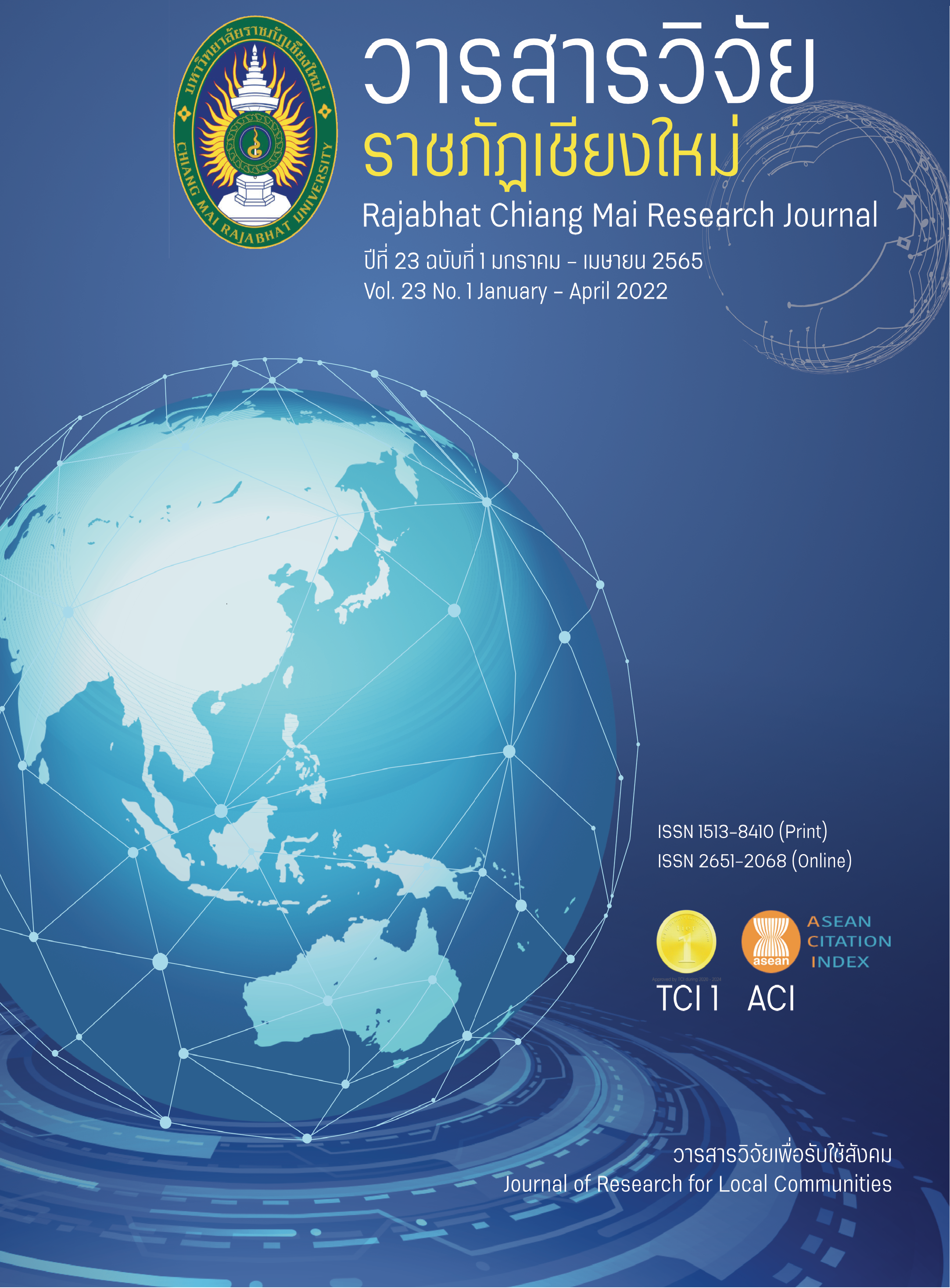Knowledge Management in Accounting for Cost and Return Analysis of Community Products
DOI:
https://doi.org/10.14456/rcmrj.2022.249414Keywords:
Community business accounting, Cost accounting, Cost and return analysisAbstract
This study aims to develop the knowledge of accounting and analyze the cost and benefit of the products from Ban Kong Ha community in Pong Yaeng Sub-district, Mae Rim District, Chiang Mai Province. As this is a Participatory Action Research, a training of accounting knowledge including the basic accounting information was provided to a number of the community’s members, which the knowledge of accounting consists of recording of receipts and payments, product cost recording, show performance of financial statements and financial position of the group in each period. The training was intended to encourage the members to become aware of the importance of accounting. The participants were evaluated their knowledge and comprehension in accounting by using questionnaires before and after the training. The result after the training showed that, the participants had a higher than of 17.43 of the knowledge and comprehension in accounting. in addition, analyzed the cost and benefit of the community’s products, it showed that the original selling prices in some products were lower than the appropriate selling prices, such as liquid products including shampoo, conditioner, shower cream, and fruit jam products, for example, group 1 liquid products Originally, the community enterprise group had set a retail price of 69 baht per unit and a wholesale price of 50-60 baht per unit, but the appropriate selling price was 72 baht per unit, etc. Therefore, in order to achieve the actual profit, the process of setting the products’ selling prices is recommended to adjust and use it as a guideline for cost-benefit analysis new community products in the future. However, accounting training sessions were organized to train the accountants from the community enterprise for the accounting record, and there were three validation checks for assessing the accuracy level each month and completeness of the actual training. The results showed that the accountants were able to record the accounts and prepare the financial statements accurately. The score levels increased, from 35 percent to 65 percent and 90 percent.
Downloads
References
Boonmeesuwan, C. (2004). Accounting System. Huachiew Chalermprakiet University, Bangkok. (In Thai)
Chai-amonphaisal, K., Jairak, S. (2014). Principles of Accounting and Taxation. Chiangmai: Chiangmai Rajabhat University. (In Thai)
Euachiraphongphan, S. (2008). Cost Accounting. (3rded.). Bangkok: McGrue-Hill International Enterprise LLC. (In Thai)
Government Savings Bank. (2022). Setting the Selling Price. Retrieved from https://www.youtube.com/watch?v=oqCE8ln0sUw&feature=youtu.be (In Thai)
Hiranrasamee, T and all. (2016). Financial Accounting. Bangkok. Wittayapat. (In Thai)
Hwangthichob, P. (2018). Cost Analysis and Cost Accounting System for Community Products: Case Study: Ban Wat Nak Rattan Basket Group, Pak Kran Sub-district, Phra Nakhon Si Ayutthaya District Phra Nakhon Si Ayutthaya Province. Journal of Management Science Review, 20(1), 74-81. (In Thai)
Jokkaew, J. (2013). Cognitive management of accounting and financial management for Bangbua building contractor business unit, Bang Khen, Bangkok Area Based Development Research Journal, 8(1), 22-41. (In Thai)
Kamjai, K. (2013). Management Accounting. Chiangmai: Chiangmai Rajabhat University. (In Thai)
Keith King. (2012). Accounting VCE Unit 3&4.5th. ed. Australia: On-demand.
Sakhakorn J., Srijunpech, S. (2009). Basic Accounting. Bangkok. TPN Pres. (In Thai)
Suksriwong, S. (2016). SWOT Analysis. Retrieved from http://www.mis.ms.su.ac.th/MISMS01/PDF01/1646_20190523_p_130.pdf (In Thai)
Suwana-ard, P. (2011). The Development of accounting system under sufficiency economy of community enterprise. Area Based Lampang Rajabhat University Journal, 8(1), 84-96. (In Thai)
Technology Promotion Association (Thailand-Japan). (2009). Principles of Setting Selling Prices. Retrieved from https://www.tpa.or.th/writer/read_this_book_topic.php?pageid=20&bookID=1173&read=true&count=true (In Thai)
Thai Winner. (2021). Break-Even Point. Retrieved from https://thaiwinner.com/break-even-point/ (In Thai)
Valaisathien, P. (1999) Theories and Principles of Community Development. Thammasat University, Bangkok. (In Thai)
Weeraphan, W. (2020). Break-Even Analysis. Retrieved from http://www.wrp-factoryconsultant.com/4-articles/2-thang-wiswkrrm/2-3-cud-khum- thun-break-even-point (In Thai)
Downloads
Published
How to Cite
Issue
Section
License
Copyright (c) 2022 Rajabhat Chiang Mai Research Journal

This work is licensed under a Creative Commons Attribution-NonCommercial-NoDerivatives 4.0 International License.
1. Articles, information, content, images, etc published in the “Community and Social Development Journal” are copyrighted by the Community and Social Development Journal, Chiang Mai Rajabhat University. In order to properly distribute the articles through print and electronic media, the authors still hold the copyright for the published articles under the Creative Commons Attribution (CC BY) license, which allows the re-distribution of the articles in other sources. References must be made to the articles in the journal. The authors are responsible for requesting permission to reproduce copyrighted content from other sources.
2. The content of the articles appearing in the journal is the direct responsibility of the article authors. The editorial board of the journal does not necessarily agree with or share any responsibility.














